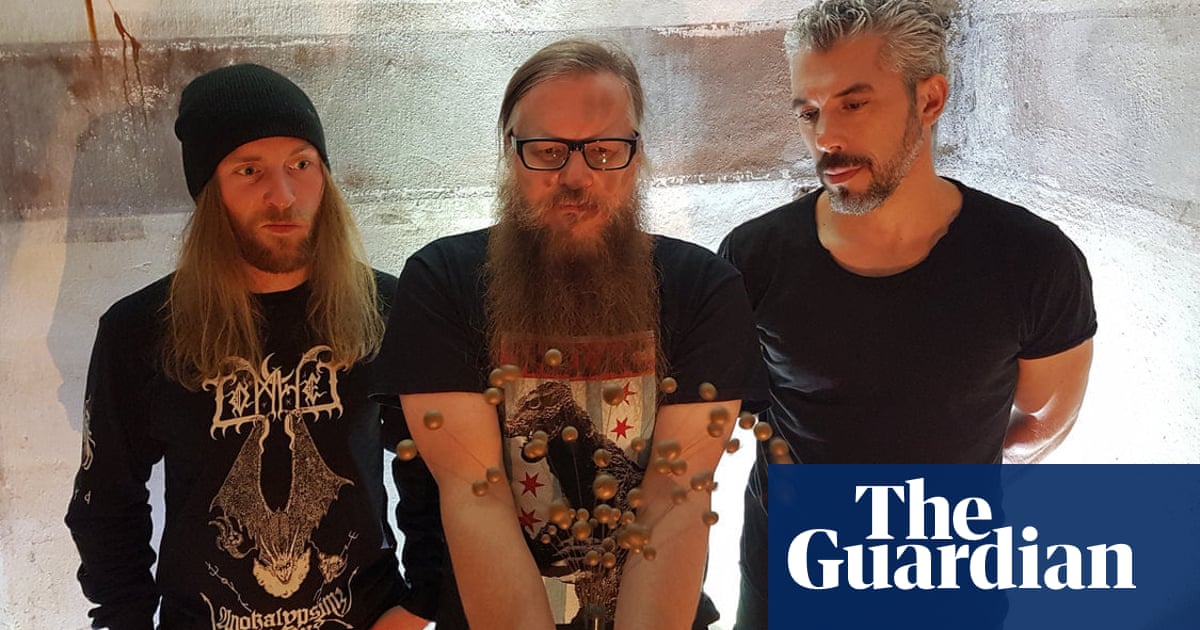
Syrian-German group, blending Arabic and Western influences, tour new album ‘Rima’
LONDON: “We do it to prove there are no borders between cultures and peoples. No matter where you come from, music is going to connect us.” Ameen Khayer, Syrian vocalist and one-third of Shkoon — who produce house music with Arabic influences — is talking to Arab News backstage at London’s Jazz Cafe, the latest stop on Shkoon’s tour to promote their latest album, “Rima.”
It’s busy here as members of the crew dash around preparing the venue for tonight’s performance. Khayer — dressed in a black beanie and grey sweater with a beige fanny pack slung across his chest — sits at a table loaded with fruit next to his bandmate, German DJ Thorben Beeken, who’s clad solely in black. Shkoon’s third member, violinist Maher Al-Kadi — also from Syria — couldn’t make the London show after breaking his leg in Paris. Conversation between Khayer and Beeken flows seamlessly between Arabic, English and German. Khayer fled Deir Ezzor in 2015 because of the ongoing civil war and ended up in Germany as a refugee (having reportedly walked around 6,500 kilometers from the Greek island of Lesbos).
He met Beeken by chance and the two ended up sharing a flat in Hamburg, where they’ve lived for the past four years. Khayer’s experiences as a refugee adjusting to life in Europe are the driving forces behind his musical contributions to the group.
“What happened to me, and what’s happening now, it’s from how I got lost,” he says. “But my reaction was to translate those feelings, those memories — not only in Syria but in Germany when I first arrived — into music. We did the whole ‘jamming’ thing, and it started to build up.”
Shkoon’s sound, naturally enough given the band’s origins, is a blend of Western and Oriental influences, although those influences are not divided down continental lines within the band. Beeken, for instance, says he’s a fan of Palestinian composer and pianist Faraj Suleiman. Khayer’s favorite Arab artist, meanwhile, is Iraqi maqam singer Mohammad Al-Qubbanchi. The maqam is a form of melody based on a rigid structure dating back at least 400 years, and Khayer is a big fan. “I love the Iraqis, because it’s different than Damascus and Egypt,” he says. “It’s different schools.”
The musical fusion of East and West isn’t a simple trick to pull off, despite the number of artists who claim to be doing it. But Shkoon’s sound has an authenticity and authority to it that goes some way to explaining the band’s growing popularity.
“Putting Oriental, Arabic scales together with Western scales is, technically, not meant to be,” Beeken says. “So it was on us to find our own way to put them together in a way that harmonizes.”
Generally, they still do that by jamming: Sitting down together with no specific structure in mind and seeing where the music takes them. “Each one of us tries to put himself in a role where we do all the stuff and we listen to each other about what’s going on,” Khayer explains.
“The first idea always goes in the trash,” says Beeken. “I don’t know why, but the first element we start with never ends up in the final version. Normally we build on it, then at some point we want to clear things up. It’s a process I really like.”
Beeken adds that whenever he tries to actually sit down and write a song, he finds that he can’t do it. Much of his inspiration comes from “the emotions of daily life and connecting with people,” he says, meaning that jamming is a more effective way of accessing his creativity than trying to force a song to emerge.
“You need strong emotions that don’t come from, ‘I want to do this now.’ They come from living, from meeting people, from whatever inspires you. It’s normally connecting with other people, new people, old friends, anything that inspires you,” he explains.
“Rima” is Shkoon’s first studio album, and the effort the trio put into recording it has paid off, they say — especially after seeing the reaction from audiences during their tour.
“I’m mind-blown by all the feedback we’ve had,” says Beeken. “When we’re onstage, the audiences are always pumping us up. They’re amazing, super-loyal, and they know all our songs, no matter whether they’re Arab or not. It’s amazing to see.”
The tour has continually sold out, and Shkoon’s London show is no exception, with fans queuing for hours before the venue opens. Shkoon are headlining the MARSM-organized event, which also featured German DJ Habibi Funk, who mixes old Arabic records with modern Western funk — a good match for Shkoon, although Khayer rejects any notion that they’re sound-alikes. An artist’s sound, he says, is like a fingerprint: “Each person has their own fingerprint, and each one has their own musical signature.”
The atmosphere of much of Shkoon’s music is another strange fusion, managing to be both melancholic and uplifting simultaneously. From what Beeken says, that’s a deliberate choice.
“Isn’t it so beautiful that when people feel melancholic they start smiling as well? We bring together the crying and the smiling,” he says. “How beautiful is it to cry while smiling?”












